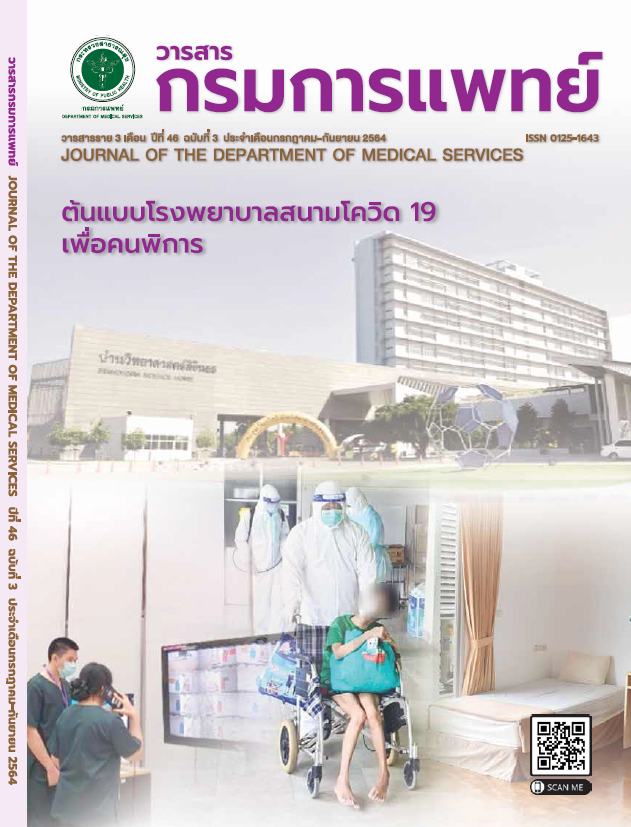Effects of Self-efficacy Enhancement Program to Food Consumption Behavior Modification among Diabetes Mellitus Risk Groups at Khlongtonsai, Khlongsan, Bangkok
Keywords:
Self-efficacy, Food consumption behavior, Risk groups of diabetes mellitusAbstract
Background: Diabetes problems continue to rise steadily. It is an important public health problem that needs to be accelerated in order to reduce future incidence of diabetes. Controlling diabetes preventative is best to lifestyle modifications, especially for diabetic risk groups. Prevention is the most important factor supporting the risk group. Therefore, researchers have developed effects of self-efficacy enhancement program to food consumption behavior modification among risk groups of diabetes mellitus.Objective: Aimed to study the effects of self-efficacy enhancement program to food consumption behavior modification among risk groups of diabetes mellitus.Method: The 70 samples were divided into 2 groups; an experimental group of 35 samples and a comparison group of 35 samples. The effects were evaluated before and after trial. The experimental group received the program created by applying self-efficacy theory. Data were collected using questionnaires. Statistics used were descriptive statistics such as frequency, percentage, mean, and standard deviation and inferential statistic as Paired sample t-test and Independent t-test at a statistical significance level of 0.05.Result: After trial, the experimental group had a higher average score than before experiment in self-efficacy= 7.14, outcome expectation= 6.66, and food consumption behavior= 5.34, significantly (p<0.001), including blood sugar level decreased 11 mg/dl. (p<0.05).Conclusion: Effects of self-efficacy enhancement program to food consumption behavior modification among risk groups of diabetes can modify dietary habits and reduces blood sugar levels in diabetes risk groups. The results suggested that the program could be applied to diabetes risk groups in other areas
References
Diabetes Association of Thailand [Internet]. Diabetes Mellitus [cited 2019 may 29]. Available from; https://www.dmthai.org/index.
Division of Non-Communicable Diseases. Report the situation of NCDs (diabetes, hypertension and related factors.) 2020.Bangkok: Aksorn Grphic And Design Publishing Limited Partnership; 2020.
Saenyacharoenkul W, Krainuwat K, Nakagasien P. Effects of a Dietary Modification Program on Food Consumption Behavior for People with prediabetes. NURS SCI J THAIL 2019; 37: 59-72.
Strategy and Planning Division. Thailand Regional Health Profile 2012-2017. Bangkok: Chinauksorn Printing Co., Ltd; 2012.
Tohha S, Kengganpanich T, Kengganpanich M, Benjakul S. The Effects of Dietary Program on Blood Sugar Control among Thai Muslim Elderly with Type 2 Diabetes Mellitus, Narathiwat Province. Thai Journal of Health Education 2020; 43: 113-29.
Bandura, A. Self-efficacy: The exercise of control. New York: W.H. Freeman and company; 1997.
Cohen J. A power primer. Psychol Bull 1992; 112: 155–9.
Kijpreedarborisuthi B. Techniques for creating data collection tools for research. 7th ed. Bangkok: Si Anan Printing Co.,Ltd ; 2010.
Areerak W, Yamboo P. Effects of Self-efficacy Promotion Program for Prevention Diabetes among Risk Women in Bothong District,Chon Buri Province. Christian University of Thailand Journal 2019;25: 80-95.
Downloads
Published
How to Cite
Issue
Section
License

This work is licensed under a Creative Commons Attribution-NonCommercial-NoDerivatives 4.0 International License.
บทความที่ได้รับการตีพิมพ์เป็นลิขสิทธิ์ของกรมการแพทย์ กระทรวงสาธารณสุข
ข้อความและข้อคิดเห็นต่างๆ เป็นของผู้เขียนบทความ ไม่ใช่ความเห็นของกองบรรณาธิการหรือของวารสารกรมการแพทย์



